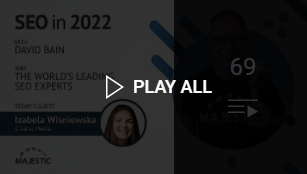-
Site Explorer
- Majestic
- Summary
- Ref Domains
- Backlinks
 New
New Lost
Lost- Context
- Anchor Text
- Pages
- Topics
- Link Graph
- Related Sites
- Advanced Tools
- Author ExplorerBeta
- Summary
- Similar Profiles
- Profile Backlinks
- Attributions
- Compare
-
Link Tools
- My Majestic
- Recent Activity
- Reports
- Campaigns
- Verified Domains
- OpenApps
- API Keys
- Keywords
- Keyword Generator
- Keyword Checker
- Search Explorer
- Link Tools
- Bulk Backlinks
- Neighbourhood Checker
- Submit URLs
- Experimental
- Index Merger
- Link Profile Fight
- Mutual Links
- Solo Links
- PDF Report
- Typo Domain
- Free SEO Tools
-
Support
- Blog

- Support
- Get started
- Tools
- Subscriptions & Billing
- FAQs
- Glossary
- How To Videos
- API Reference Guide

- Contact Us
- About Backlinks and SEO
- SEO in 2024
- Link Building Guides
- Webinars
- Blog
Mark up your website with every bit of Schema that you can
Jonny Ross
Jonny feels that Schema is still very much overlooked, and that marking your site up with as much Schema as possible will greatly assist Google in understanding the context of your content.

Mark up your website with every bit of Schema that you can
Jonny says: "It's clear from Google that marking up content is what they want. If you have a website with content on it, you need to mark it up so that Google understands it. You need to give Google the content on a plate - what it's for and what it's related to - so that Google can use it in its search."
Is schema essential for every type of website?
"There's not a single website that shouldn't have some schema on it. Even if you are a local business, you could mark up your contact page with your address, phone number, Facebook account, etc. This is true all the way up to if you're an airline. There is airline schema, sports organisation schema and government organisation schema. If you look at local businesses, there is schema for animal shelters, childcare, and dentistry - to give you just a flavour. There is going to be a specific schema for you. If you are a dentist, you'd be silly not to use dentistry schema, to make it clear to Google that you're an official dentist."
Is it important to mark up other content as well, or mainly what you are as a business?
"It's far from just marking up your organisation or address. There are so many different types of schema that may be relevant to your site - from recipe schema to job schema, from schema for videos you are showing to schema for events you are running. There's not much content that you can't mark up. It's also about relating the schema. If you've got a service page, and the schema says what that service is, you can then relate it to the Meet the Team page, where you can say who delivers that service. Then, you can relate it to some of the other services that they deliver. You can also look deeper into the service and look at some of the keywords related to it. There will be other schemas that are deeper that you can relate to that as well. This way, you're painting a strong picture to Google that you're really relevant for that particular service."
How can you measure the success of implementing schema on your website?
"It's really simple. There is a misconception that the only ways that you can measure success are through ranks and traffic. Actually, inside Search Console, you can measure things like rich snippets and structured data, and how many times these have been shown in search. These are some really easy ways to track the impact, and can lead to number of impressions, number of clicks, etc. It can be easy to implement, depending on the site content."
Is there a plugin that will do this automatically for, say, a Wordpress website?
"I was recently looking at Rank Math, which is a competitor for Yoast, and there are some big benefits to it, but I don't think there's a plugin that has the capability to implement the type of schema we're talking about, yet. You're either using custom fields, or you're hard coding to relate all these things together. The issue is that there's so many different types of entities, and types of content, that a plugin would struggle to be able to offer it all."
If schema is hard coded on to a web page, is it something that may have to be removed at some point?
"Potentially. For a very small website, where you're looking at just an address on a contact page, then it's a lot quicker and easier to just hard code the schema than anything else. For a large website that has a significant number of pages and categories, then you would look for a better solution. Hard coding shows that schema can be implemented quickly and easily. In a small business, it doesn't need to be kept on top of, because you're not changing information like the address, or the Twitter account often. It's information that stays in the footer of your website or sits on your Contact Us page."
In layman's terms, how does Schema work?
"As an example of how schema works: if you Google 'chicken pasta' you will be presented with a number of different recipes. Each one has a picture, the cook time, the ingredients, etc. - and it will show you the reviews as well. Those bits of data are being shown to you because they're marked up on the website using schema. Therefore, Google categorically knows what the official cook time, or number of calories, is and can show it on the search page. Without the schema, you would need a human to actually read the page and categorise those bits of information. Review schema is a good example of something that needs to be marked up, to say to Google what your official reviews are, what your average rating is, etc."
Would the About Us page, and perhaps the footer section of the website, be the best place to get started with this?
"The quickest win is being able to say to Google: this is the official name, the address, and the phone number, and these are social media links. Those things commonly would be on the Contact Us page or in the footer of the site. You also have the ability to mark up the logo to say this is the official organization's logo. Those would be the first things to implement. Then it would depend on the category of the website. If you are a recruitment website, you absolutely need job schema; if you're a recipe website, you absolutely need recipe schema. If you're B2B or providing services, then you need to start thinking about how you can mark up the services. You need to make sure that you are connecting the dots for Google and showing the relevance of your services.
It's all about giving the search engine greater confidence in what your content is about. Schema is one of the few things that all search engines have agreed on using. Whether it's Bing, Google, or Yahoo - it doesn't matter. The format is the same for each search engine so, as long as you focus on schema, you're ticking the boxes for all search."
How does an SEO articulate the commercial value of marking up schema to management?
"If they buy into SEO in the first place, and into how traffic is brought to a website, then breaking down how schema works will make the value fairly obvious. You can also give examples. You might look at featured snippets and look at voice searches based on the top featured snippet, which is based on schema. It's easy to demonstrate schema being used in a lot of different places. You can show what a great listing looks like on a mobile device, for example, with good schema that has additional rich elements. Then compare that to a listing without good schema, that won't show information like reviews and contact details.
Typically, the data will show change within two or three weeks of implementation. The changes will speak for themselves in terms of results in Search Console."
What is the difference, in terms of click-through, for a result that has rich elements on it compared to a standard search listing?
"In the data there is a clear difference, in terms of click-through rates, when you have got rich data around a listing. I have a particular client that dominates in Google for having reviews on their listings. For any search that's related to them, they appear, and 9 times out of 10, they're the only result on the page that has a review listed. That drives a lot of traffic. I haven't got the numbers to share with you, but it's common sense that the eye is drawn to it, and it has a trust factor.
It has a similar impact to Google Authorship, where you were able to put a picture of the author next to the listing, but it's supported by multiple search engines so it's not going away.
The brilliant thing about schema is that it's content that's visible on the page, unlike meta titles and meta descriptions. You're marking up content, we're not talking about something that's hidden."
What's one thing that SEOs should stop doing, to focus more time on schema?
"Google came out this week talking about meta titles, and how they are going to have far less weighting on the headlines that will be used within search. What they are going to be far more interested in is H1s, H2s and H3s on the page. They want to provide content that's more likely to fit the page than what you're trying to tell Google the page is about. This backs up the value of schema because, firstly, Google likes markup and, secondly, it's visible content on the page. The thing to stop focusing on is invisible content like title tags and meta titles."
You can find Jonny Ross over at Fleek.marketing.
Choose Your Own Learning Style
 Video
Video
If you like to get up-close with your favourite SEO experts, these one-to-one interviews might just be for you.
Watch all of our episodes, FREE, on our dedicated SEO in 2022 playlist.
 Podcast
Podcast
Maybe you are more of a listener than a watcher, or prefer to learn while you commute.
SEO in 2022 is available now via all the usual podcast platforms
Don't miss out
Opt-in to receive email updates.
It's the fastest way to find out more about SEO in 2025.
Could we improve this page for you? Please tell us





